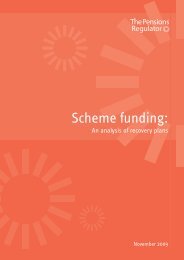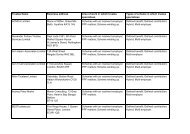Avoiding delays in winding up pension schemes consultation (PDF ...
Avoiding delays in winding up pension schemes consultation (PDF ...
Avoiding delays in winding up pension schemes consultation (PDF ...
Create successful ePaper yourself
Turn your PDF publications into a flip-book with our unique Google optimized e-Paper software.
Clearance process<br />
Some parties suggested that the regulator should consider implement<strong>in</strong>g a<br />
process which would <strong>in</strong>volve trustees seek<strong>in</strong>g approval from the regulator on<br />
their proposed approach of deal<strong>in</strong>g with a particular w<strong>in</strong>d<strong>in</strong>g <strong>up</strong> issue for their<br />
scheme. For example this might be to avoid <strong>in</strong>curr<strong>in</strong>g legal fees <strong>in</strong>volved <strong>in</strong><br />
gett<strong>in</strong>g a court decision. Such a process would also provide some <strong>in</strong>demnity<br />
for the trustees from any future liability to members.<br />
The regulator’s view is that it is not one of our regulatory functions to provide<br />
this type of clearance. We rema<strong>in</strong> of the view that it is ultimately the trustees’<br />
duty to ensure decisions are made <strong>in</strong> the best <strong>in</strong>terests of members, tak<strong>in</strong>g<br />
<strong>in</strong>to account the <strong>in</strong>formation they have on the scheme and advice received<br />
from their professional advisers. We do not consider it appropriate for the<br />
regulator to approve such decisions by trustees as that would underm<strong>in</strong>e<br />
trustees’ responsibility for w<strong>in</strong>d-<strong>up</strong>.<br />
The regulator does operate an exist<strong>in</strong>g statutory and voluntary clearance<br />
process whereby parties can obta<strong>in</strong> assurance that based on the <strong>in</strong>formation<br />
provided the regulator will not, <strong>in</strong> respect of certa<strong>in</strong> events, use its antiavoidance<br />
powers to issue, to the applicants for clearance, either Contribution<br />
Notices or F<strong>in</strong>ancial S<strong>up</strong>port Directions <strong>in</strong> relation to a def<strong>in</strong>ed benefit<br />
occ<strong>up</strong>ational <strong>pension</strong> scheme.<br />
Use of powers<br />
Views were expressed that it was not evident that the regulator was us<strong>in</strong>g its<br />
powers to best effect to help parties speed <strong>up</strong> the w<strong>in</strong>d-<strong>up</strong> process, for<br />
example, direct<strong>in</strong>g parties to take action to speed <strong>up</strong> the w<strong>in</strong>d-<strong>up</strong> process.<br />
The tripartite regulatory statement sets out a new approach that outl<strong>in</strong>es our<br />
expectations for scheme w<strong>in</strong>d <strong>up</strong>s and clarifies the powers that we are most<br />
likely to use. This approach <strong>in</strong>cludes issu<strong>in</strong>g directions to parties where we<br />
consider there has been an unreasonable delay, and makes it clear that this<br />
will be one of the pr<strong>in</strong>cipal enforcement powers we can use.<br />
How to respond to the <strong>consultation</strong><br />
We would welcome feedback on the attached documents <strong>in</strong> general, but are<br />
particularly <strong>in</strong>terested <strong>in</strong> comments on the follow<strong>in</strong>g areas:<br />
Regulatory statement<br />
1. Have you any other suggestions on how the regulator, PPF and<br />
DWP <strong>in</strong> respect of FAS can work together so as to ensure<br />
approaches are aligned <strong>in</strong> a way that contributes to speed<strong>in</strong>g <strong>up</strong><br />
w<strong>in</strong>d-<strong>up</strong>s and <strong>schemes</strong> pass<strong>in</strong>g through an assessment period?<br />
2. Do you agree with the exceptions we have specified for <strong>schemes</strong><br />
w<strong>in</strong>d<strong>in</strong>g <strong>up</strong>? If you consider there to be a case for further<br />
exceptions, what is the evidence for this?<br />
6
















